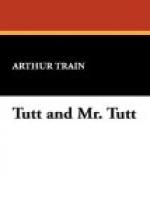“If the facts are as you state them, Mr. Tutt,” he answered seriously, “the plan on its face would seem to be inequitable. If the property is worth ten million the consideration is palpably inadequate. Your client’s equity, worth on that basis at least one hundred thousand dollars, would be entirely destroyed without any redress.”
“Your Honor,” burst out Mr. Chippingham, whose bald head had been bobbing about in excited contiguity with the tall hats, “this is a most misleading statement. The assets of Horse’s Neck aren’t worth a hundred thousand dollars. And if any of the minority don’t want to come into the reorganization—and I assure Your Honor that we would welcome their participation—they can have their equity appraised under the laws of Delaware and the finding becomes a lien on the assets even after they have been transferred.”
“What relief does that give a man like Mr. Barrows?” shouted Mr. Tutt. “He can’t afford to go down to Wilmington with a carload of books and a corps of experts to prove the value of Horse’s Neck. It would cost him more than his stock is worth!”
“That remedy is not exclusive, in any event,” declared the judge. “If this complainant is going to be defrauded I will enjoin this contract pendente lite and appoint a receiver.”
“Your Honor!” protested Chippingham in great agony. “It is not the fact that this mine is worth ten million. It isn’t worth at the most more than one hundred thousand. It is, full of water, the machinery is rusted and falling to pieces and the workings are practically exhausted. The only way to rehabilitate this property is for everybody to come in and put up enough money by subscribing to the stock of the new corporation to pump it out, buy new engines and start producing again. Is it fair to the majority, who are willing to go on, put up more money, and make an attempt to save the property, to have this complainant—an ex-convict who never paid a cent for his stock, dug up from heaven knows where—enjoin their contract and throw the corporation into the hands of a receiver? This is nothing but a strike suit. I repeat—a strike suit!”
He glowered breathless at his adversary.
“Oh! Oh!” groaned Mr. Tutt in horrified tones.
“Gentlemen! Gentlemen!” expostulated the court. “This will not do!”
“I beg pardon—of the court,” stammered Mr. Chippingham.
“Your Honor,” mourned Mr. Tutt, “I have practised here for thirty years and this is the first time I have ever been insulted in open court. A strike suit? I hold in my hand”—he waved it threateningly at the tall hats—“a circular issued by these directors less than five years ago, in which they give the itemized value of this property as ten million dollars. Shortly after that circular was issued the stock sold in the open market at one dollar and ninety cents a share. In two years it sank to ten cents a share. Will a little water, a little rust, a little trouble with labor reduce the value of a great property like this from ten millions of dollars to one hundred thousand—one per cent of its appraised value? Either”—he fixed Chippingham with an exultant and terrifying glance—“they were lying then or they are lying now!”




